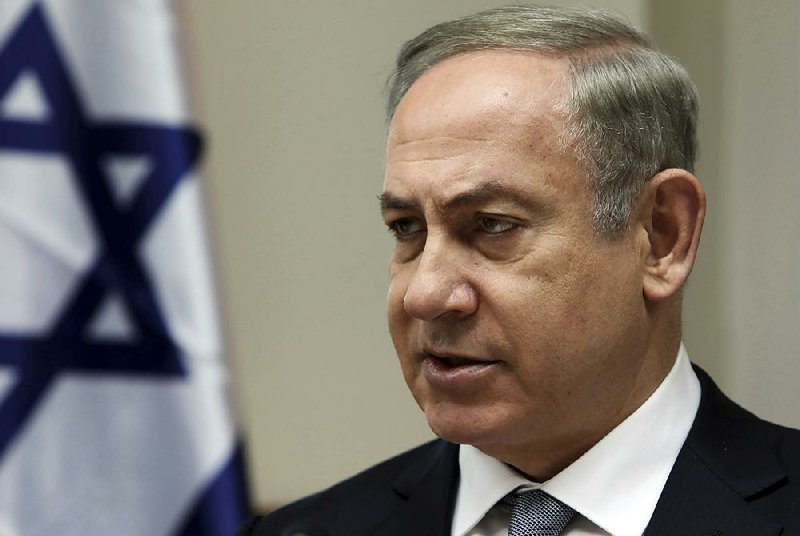JERUSALEM -- Israel's prime minister heads to Washington this week for a high-profile meeting with President Donald Trump that suddenly is clouded in uncertainty.
RELATED ARTICLES
http://www.arkansas…">Trump knew Flynn deceit 2 weeks ago http://www.arkansas…">Judge bars Trump travel ban in Virginia http://www.arkansas…">Hold detainees, senators urge http://www.arkansas…">NATO chief urges boost in spending http://www.arkansas…">Records reported to show Trump allies' Russia contacts http://www.arkansas…">Senate confirms McMahon to lead small-business agency http://www.arkansas…">U.S. sees treaty breach as Russia deploys missile
After embracing Israel's hard-line nationalist right throughout his presidential campaign, Trump appears to have softened some of his positions on key issues since taking office.
Although today's meeting is expected to be much warmer than Netanyahu's tense encounters with former President Barack Obama, the Israeli leader still will need to tread with caution on sensitive issues like Israeli settlement construction, conflicts with the Palestinians and Iran and the war in Syria.
"It is a very important meeting. It is a new president," said Sallai Meridor, a former Israeli ambassador to Washington. The "positive thing" is that Trump's policies are still not set, he said, "so there is an opportunity to listen and to develop and to impact the strategy that is being developed in the United States."
[PRESIDENT TRUMP: Timeline, appointments, executive orders + guide to actions in first 100 days]
In dealing with such a divisive president, Netanyahu will also face some potential pitfalls. Key constituencies, including congressional Democrats and many American Jews, oppose Trump's policies, while at home the Israeli leader is under pressure from his hard-line allies to push for policies that Trump may not support.
Ahead of the visit, Netanyahu said he would handle ties with the U.S., Israel's closest and most important ally, in a "prudent manner," but he steered clear of specifics.
"The alliance between Israel and America has always been extremely strong. It's about to get even stronger. President Trump and I see eye to eye on the dangers emanating from the region, but also on the opportunities," Netanyahu said Monday as he boarded a plane to Washington.
Malcolm Hoenlein, a Jewish-American leader who has close ties with both Netanyahu and White House officials, said Netanyahu should set modest goals for his first working meeting with the new president. He said the objective should be to establish a good working relationship in order to tackle concrete issues down the road.
"What I hope will come out of the meeting is this kind of understanding, putting the foundation very firmly in place," he said.
After repeatedly clashing with Obama for eight years, capped by a U.N. Security Council resolution condemning Israeli settlements, Netanyahu seemed relieved by Trump's victory.
Trump's campaign platform made no mention of a Palestinian state, and his inner circle included allies of the West Bank settler movement. The connections were so strong that a delegation of settler leaders was invited to Trump's inauguration.
Netanyahu responded by approving construction of more than 6,000 new settler homes in the West Bank and east Jerusalem -- occupied territories claimed by the Palestinians -- and allowing the parliament to pass a law retroactively legalizing some 4,000 settlement homes built on private Palestinian land.
His political allies have urged him to go even further, suggesting he abandon the goal of a two-state solution with the Palestinians, step up settlement construction and even consider annexing parts of the West Bank. Such ideas would have been unthinkable during the Obama years.
"All the Cabinet ministers oppose a Palestinian state, including Netanyahu," said Gilad Erdan, a Cabinet minister and member of Netanyahu's Likud Party.
But the hard-line euphoria may be premature. After initially greeting Israel's settlement announcements with a shrug, Trump appears to be having second thoughts. In an interview with a pro-Netanyahu Israeli daily on Friday, Trump said: "I am not somebody that believes that going forward with these settlements is a good thing for peace."
Information for this article was contributed by Ian Deitch and Aron Heller of The Associated Press.
A Section on 02/15/2017
